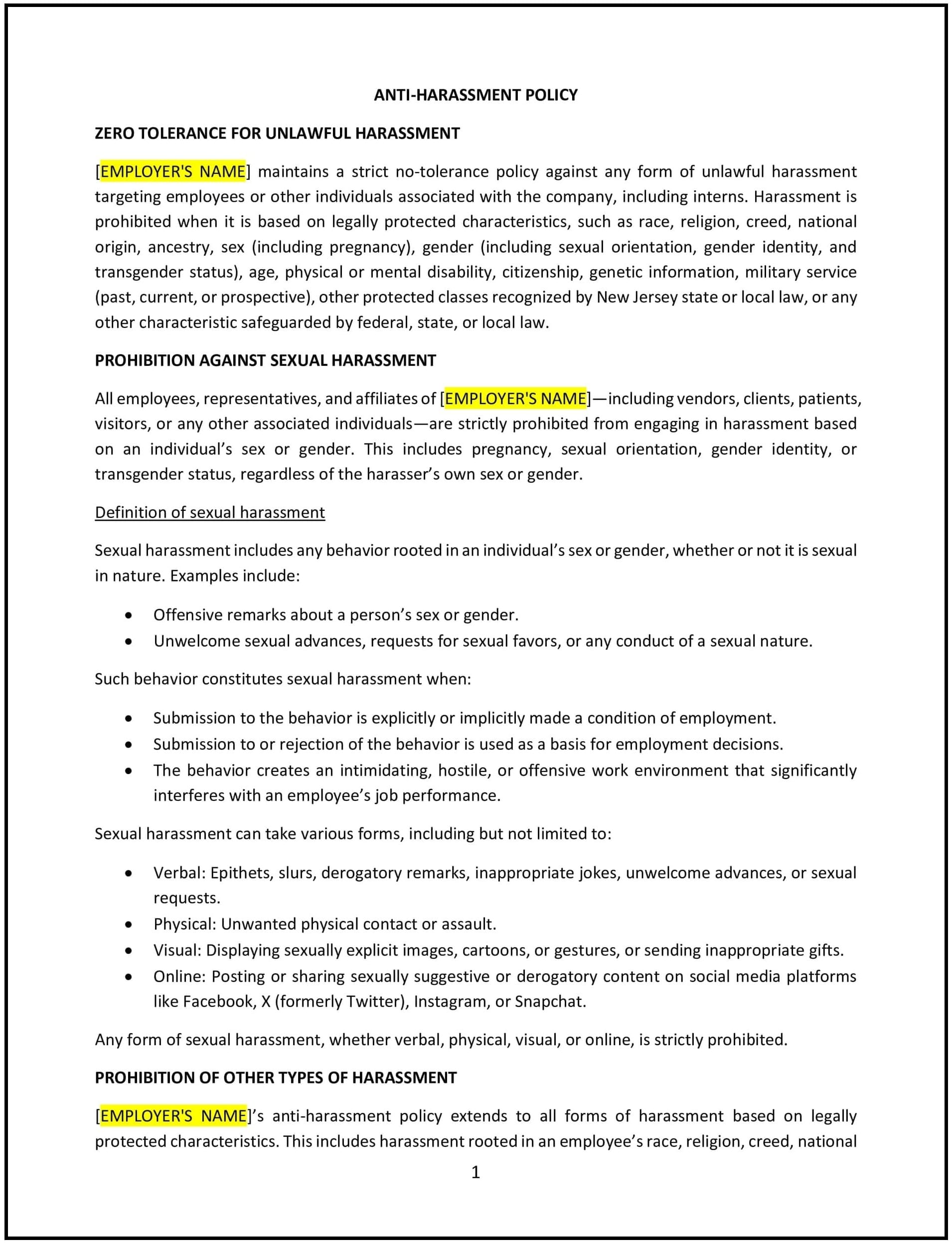Got contracts to review? While you're here for policies, let Cobrief make contract review effortless—start your free review now.

Customize this template for free
Anti-harassment (New Jersey)
An anti-harassment policy helps New Jersey businesses create a workplace free from harassment, discrimination, and intimidation. This policy outlines the types of behavior that constitute harassment, the reporting and investigation procedures, and the company’s commitment to fostering a respectful work environment. It provides clear expectations for employees, supervisors, and managers in preventing and addressing harassment in the workplace.
By adopting this policy, businesses in New Jersey can promote a culture of respect, reduce legal risks, and ensure that all employees feel safe and valued.
How to use this anti-harassment policy (New Jersey)
- Define harassment: Clearly define what constitutes harassment, including sexual harassment, discriminatory harassment, and other forms of unwelcome conduct based on race, gender, age, disability, religion, or other protected characteristics.
- Outline prohibited behaviors: Describe specific behaviors that will not be tolerated, including verbal abuse, offensive jokes, inappropriate physical contact, and any other conduct that creates a hostile work environment.
- Establish reporting procedures: Provide employees with clear steps on how to report harassment, including whom to contact, how to submit complaints, and what information should be included in a report.
- Ensure confidentiality: Explain how reports of harassment will be handled discreetly and confidentially to the extent possible, protecting both the complainant and the accused during the investigation.
- Detail the investigation process: Describe the steps the company will take to investigate complaints, including timelines, documentation, and how findings will be communicated to the parties involved.
- Implement corrective actions: Specify the consequences for engaging in harassment, including verbal warnings, suspension, termination, or other disciplinary actions based on the severity of the behavior.
- Provide training and awareness: Require all employees, including managers and supervisors, to undergo regular harassment prevention training to recognize and address harassment effectively.
- Review and update: Regularly review and update the policy to reflect changes in New Jersey state laws, workplace trends, and best practices in preventing workplace harassment.
Benefits of using this anti-harassment policy (New Jersey)
This policy provides several benefits for New Jersey businesses:
- Promotes a respectful workplace: Encourages a professional work environment where all employees feel safe and valued.
- Reduces legal risks: Helps businesses address harassment issues before they escalate into legal claims or workplace disputes.
- Enhances employee morale: Employees who feel protected from harassment are more likely to be engaged, productive, and satisfied with their work environment.
- Encourages accountability: Establishes clear expectations and consequences for inappropriate behavior, reinforcing a culture of accountability.
- Demonstrates commitment to ethical business practices: Shows that the company prioritizes a fair and inclusive workplace, enhancing its reputation and ability to attract top talent.
Tips for using this anti-harassment policy (New Jersey)
- Communicate the policy clearly: Ensure all employees are aware of the policy, its expectations, and their rights. Include the policy in employee handbooks and discuss it during onboarding.
- Encourage reporting: Foster an environment where employees feel safe coming forward with concerns without fear of retaliation.
- Ensure prompt investigations: Respond quickly to reports of harassment, thoroughly investigating claims and taking appropriate corrective action.
- Monitor workplace culture: Regularly assess workplace conditions to identify any patterns of harassment and address potential risks proactively.
- Train all employees regularly: Provide ongoing harassment prevention training to ensure employees understand how to identify and prevent inappropriate workplace behavior.